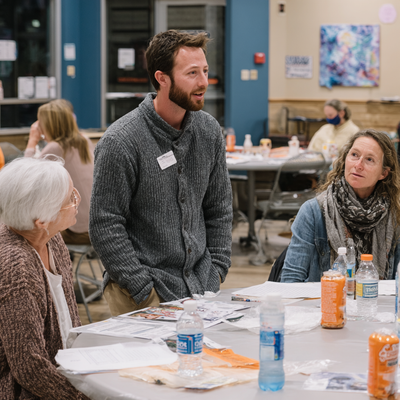Sarah comes up to me after service looking stressed and goes "I can't do VBS this year. I know you're counting on me but my mom's having surgery and I just can't commit to anything else right now."
My first thought? Oh no. Sarah's one of my best volunteers. She knows all the kids. She's reliable. She's creative. How am I gonna replace her for VBS?
My second thought? Sarah looks like she's about to cry and here I am thinking about my volunteer schedule instead of caring about what she's going through.
That's when it hit me. I've been so focused on making sure ministry runs smoothly that I forgot volunteers are actual people with real lives and problems and limits.
Been doing this whole thing backwards honestly. Treating people like they exist to serve the ministry instead of ministry existing to serve people.
Had this uncomfortable realization that maybe I've been more concerned about filling spots than caring for humans. Which is pretty much opposite of what ministry supposed to be about.
The Reality Check I Needed
Started really looking at how I approach volunteers and realized I've been seeing them as solutions to my problems instead of people with their own needs.
Need someone for preschool? Ask Jessica. Need coverage for middle school? Call Tom. Someone to plan activities? Sarah's great at that.
Never really asked what they wanted to do or what they were good at or what was going on in their lives. Just plugged them into whatever hole I needed filled.
Jessica mentioned few months ago that she'd love to try teaching older kids sometime because her own daughter was moving up to elementary. Did I follow up on that? Nope. Too busy keeping her in preschool because that's where I needed her.
Tom's been doing same job for three years and probably bored out of his mind but I never asked if he wanted try something different. Just assumed he was happy because he kept showing up.
Sarah's been taking on more and more responsibilities because she's so good at everything but I never checked if she was getting overwhelmed. Just kept piling stuff on because she never said no.
No wonder she looked ready to cry. I've been treating her like employee instead of person.
What Volunteers Actually Need
Turns out volunteers need way more than just clear job descriptions and appreciation events.
They need to feel like their own growth and interests matter not just ministry's needs.
They need boundaries respected even when saying yes would solve my problems.
They need honest communication about expectations instead of just hoping they'll figure it out.
They need to know it's okay to change roles or take breaks or step away when life gets complicated.
They need to feel valued for who they are not just what they do for ministry.
Basically they need to be treated like whole humans instead of just volunteer resources.
Learning to Ask Better Questions
Instead of "Can you cover this class?" started asking "What's something you'd like to try doing?"
Instead of "We really need you for this event" started asking "What would make this meaningful for you?"
Instead of assuming people are happy in their roles started asking "How's this working for you? What would you change?"
Instead of just giving assignments started asking "What are you naturally good at that we might not be using?"
Tom mentioned he'd always been curious about planning lessons but felt intimidated. So we started having him help with curriculum selection and activity planning.
Jessica got to try teaching older kids and absolutely loved it. Now she splits time between age groups which keeps her more engaged.
Mike who I had doing setup every week mentioned he'd prefer working directly with kids. Turns out he's amazing at connecting with shy kids who usually don't participate.
Who knew? Actually asking people what they want reveals what they want.
When Ministry Goals Conflict with People Needs
This is where it gets tricky because sometimes what's best for individual volunteer isn't what's best for ministry and vice versa.
Sarah wanting to step back from VBS leadership when I really needed her experience and skills.
Tom wanting to try different role when he was already great at what he was doing and training someone new would take time.
Jessica wanting to work with older kids when preschool really needed consistency.
Easy to just say no and keep people where they are because change is hard and inconvenient.
But realized that's short-term thinking. Volunteers who feel stuck or unheard eventually burn out or just disappear.
Better to work with people's interests and limitations even if it creates temporary challenges.
Finding Creative Solutions
When Sarah couldn't do VBS leadership asked if she'd be willing to help train someone else to take over. She was happy to do that because it felt manageable and still helpful.
When Tom wanted try different role had him shadow other positions while still doing his regular job. Then gradually transitioned him when he found something he liked better.
When Jessica wanted work with older kids created role where she could float between age groups instead of being locked into one.
When Mike wanted work with kids instead of setup had him partner with experienced volunteer so he could learn while still contributing.
Most problems have solutions if you're willing to be flexible and creative instead of just rigid about how things "have to" be done.
Setting Realistic Expectations
Had to get honest about what ministry actually requires versus what I thought it required.
Do we really need same volunteer in same role every single week? Or can we rotate people and give them breaks?
Do we really need everything planned months in advance? Or can we be more flexible and responsive to what volunteers can actually commit to?
Do we really need elaborate programs? Or can we do simpler things that don't require as much volunteer coordination?
Turned out lot of things I thought were essential were just preferences or habits.
Communication Actually Matters
Started having regular check-ins with volunteers instead of just assuming everything was fine.
"How's this going for you?" "What's working well?" "What would you change?" "What support do you need?"
Amazing how much you learn when you actually ask instead of just hoping for best.
Found out Jessica felt overwhelmed by craft prep but didn't want to complain. Easy fix - got her helper for that part.
Discovered Tom was interested in worship leading but thought he wasn't qualified. Connected him with our worship coordinator for training.
Learned that Mike's work schedule changed and early morning setup was getting difficult. Switched him to cleanup crew which worked better for everyone.
Simple conversations prevent big problems later.
When to Say No to Ministry Opportunities
This one's hard because there's always more good things we could be doing than we have volunteers to do them.
VBS could be two weeks instead of one. We could add Wednesday night programming. We could start parent workshops. We could do community outreach events.
All good ideas. But if doing them means burning out volunteers or forcing people into roles they don't want then maybe we shouldn't do them.
Better to do fewer things well with happy engaged volunteers than try to do everything with stressed overwhelmed people.
Had to learn that saying no to good opportunities sometimes means saying yes to volunteer wellbeing.
The Long View
Volunteers who feel heard and valued stick around longer.
Volunteers who get to grow and try new things stay more engaged.
Volunteers who have their boundaries respected trust you more.
Volunteers who feel cared for as people not just workers become more committed to ministry.
Worth making short-term adjustments to keep good people long-term.
Sarah who stepped back from VBS? Six months later she volunteered to coordinate Christmas program because she felt ready to take on something again and knew I'd respect her limits.
Tom who wanted try different roles? Now he's training other volunteers because he feels invested in ministry's success.
Jessica who got to work with different ages? Became one of our most versatile volunteers because she understands how all age groups connect.
What I'm Doing Different Now
Actually asking volunteers what they want instead of just telling them what I need.
Creating roles that fit people instead of forcing people to fit predetermined roles.
Having honest conversations about capacity and limitations instead of just hoping people will stretch themselves.
Looking for creative solutions when individual needs conflict with ministry goals.
Saying no to some opportunities so volunteers don't get overwhelmed.
Treating volunteer development as important as program development.
The Real Goal
Ministry exists to serve people not other way around.
If we're burning out volunteers or ignoring their needs to make programs work then we're missing the point.
Goal is creating environment where both ministry and volunteers can thrive together.
Sometimes that means adjusting expectations or changing plans or finding different approaches.
But volunteers who feel valued and cared for will give their best effort and stick around longer.
That's better for everyone including the kids we're trying to serve.
Sarah who was ready to cry about letting me down? Now she tells other people how much she loves volunteering here because she knows her needs matter too.
That's what healthy ministry culture looks like.








